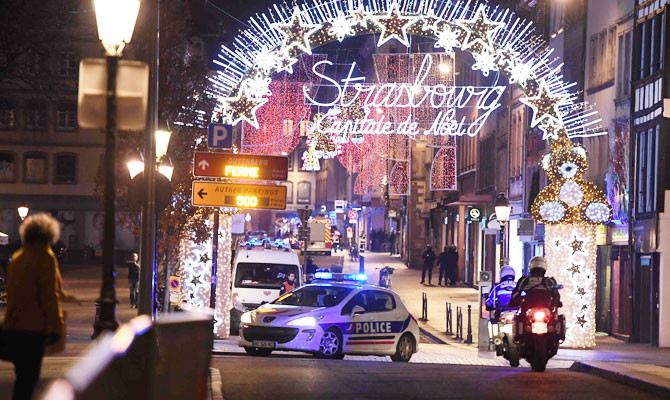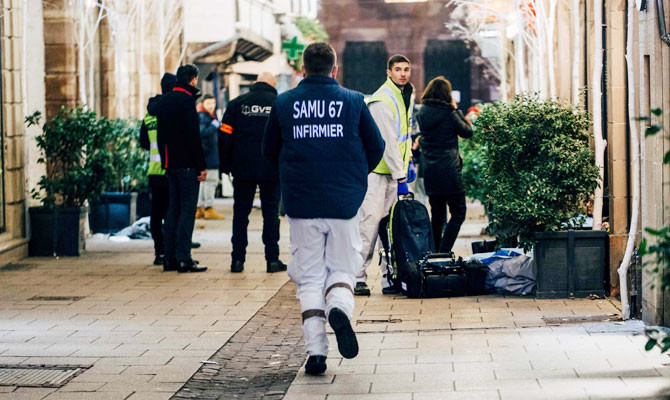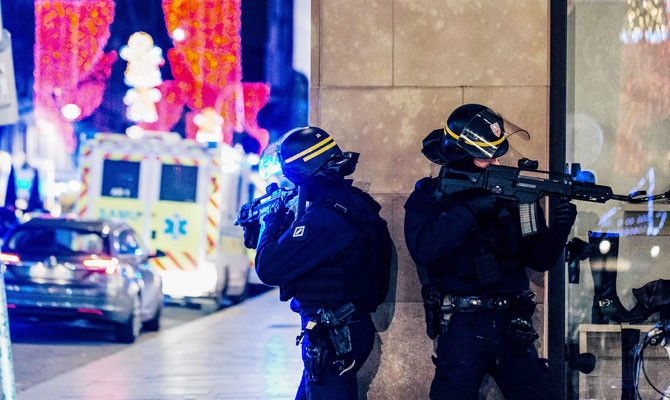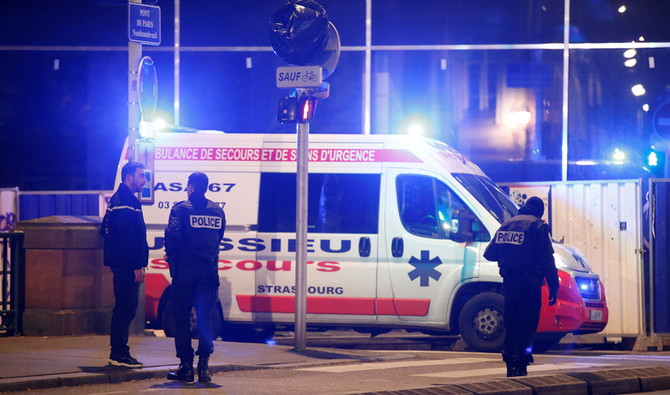PARIS: A shooting in the French city of Strasbourg killed three people and wounded 11 others near a world-famous Christmas market Tuesday, sparking a broad lockdown and a search for the suspected gunman, who remained at large.
French prosecutors said a terrorism investigation was opened, though authorities did not announce a motive for the bloodshed. The city is home to the European Parliament, which was locked down after the shooting.
It was unclear if the market — which was the nucleus of an Al-Qaeda-linked plot in 2000 — was targeted. The prefect of the Strasbourg region said the suspect was previously flagged as a possible extremist.
The gunman has been identified and has a criminal record, according to Interior Minister Christophe Castaner.
The death toll, first reported as one, rose to three by late Tuesday, according to two police union officials. One official, Stephane Morisse of union FGP, told The Associated Press the alleged shooter was wounded by soldiers guarding the market.
Gendarmes went to the suspect’s home to arrest him earlier Tuesday, before the attack, but he wasn’t there, Morisse said. They found explosive materials, he said.
French military spokesman Col. Patrik Steiger said the shooter did not aim for the soldiers patrolling in and around the Christmas market, but targeted civilians instead.
Several of the people wounded were in critical condition, the interior minister said.
Witnesses described to the AP hearing gunshots, screams and the shouts of police officers ordering people to stay indoors before the area fell silent and the officers fanned out.
“I heard two or three shots at around 7:55 p.m. (1855 GMT), then I heard screams. I got close to the window. I saw people running. After that I closed the shutters. Then I heard more shots, closer this time,” Yoann Bazard, 27, who lives in central Strasbourg.
“I thought maybe it’s firecrackers,” he said, speaking by phone. “And then, as it got close, it was really shocking. There were a lot of screams. ... There were police or soldiers shouting ‘Get inside!’ and ‘Put your hands on your head.’“
Freelance journalist Camille Belsoeur was at a friend’s apartment when they heard the gunfire, at first mistaking it for firecrackers.
“We opened the window. I saw a soldier firing shots, about 12 to 15 shots,” Belsoeur said,
Other soldiers yelled for people to stay indoors and shouted ‘Go home! Go home!’” to those outside, he said. .
Another witness, Peter Fritz, told the BBC one of the people killed was a Thai tourist who was shot in the head and didn’t respond to lengthy attempts to revive him.
“We tried our best to resuscitate him. We applied CPR. We dragged him into a restaurant close by,” Fritz said.
He said it took more than 45 minutes for an ambulance to arrive, during which time an emergency doctor advised by telephone “that any further efforts would be futile.”
The victim “is still here in this restaurant but we have abandoned all hope for him,” Fritz said.
France previously endured several high-profile extremist attacks, including the coordinated attacks at multiple Paris locations that killed 130 people and wounded hundreds in November 2015. A 2016 truck attack in Nice killed dozens.
President Emmanuel Macron adjourned a meeting at the presidential palace Tuesday night to monitor the emergency, his office said, indicating the gravity of the attack.
Castaner and the Paris prosecutor, who is in charge of anti-terror probes in France, headed to Strasbourg. The prosecutor’s office said the investigation was being conducted on suspicion of murder and attempted murder in relation with a terrorist enterprise charges, suggesting officials think the alleged shooter may have links to extremists.
In multiple neighborhoods of Strasbourg, the French Interior Ministry urged the public to remain indoors. Local authorities tweeted for the public to “avoid the area of the police station,” which is close to the city’s Christmas market.
Strasbourg’s well-known market is set up around the city’s cathedral during the Christmas season and is a popular gathering place.
French soldiers were on patrol after the shooting. At the scene, police officers, police vehicles and barricades surrounded the sparkling lights of the market.
“Our security and rescue services are mobilized,” Castaner said.
European Parliament spokesman Jaume Duch said that “the European Parliament has been closed and no one can leave until further notice.” It wasn’t immediately clear how many people were inside.
The attack revived memories of a new millennium terror plot targeting Strasbourg’s Christmas market. Ten suspected Islamic militants were convicted and sentenced to prison in December 2004 for their role in a plot to blow up the market on the New Year’s Eve ushering in 2000..
The Algerian and French-Algerian suspects — including an alleged associate of Al-Qaeda leader Osama bin Laden — went on trial in October on charges they were involved in the foiled plot for the attack.
They were sentenced to prison terms ranging from one to nine years.
France shooting: 3 dead, several wounded in Strasbourg
France shooting: 3 dead, several wounded in Strasbourg

- The shooter was believed to be a 29-year-old from the city who was set to be arrested on Tuesday morning
Vice President-elect JD Vance resigns from the Senate

Vance made his intentions known in a letter Thursday to Ohio Republican Gov. Mike DeWine, who will choose his successor.
“To the people of Ohio, I extend my heartfelt gratitude for the privilege of representing you in the United States Senate. When I was elected to this office, I promised to never forget where I came from, and I’ve made sure to live by that promise every single day,” Vance wrote.
“As I prepare to assume my duties as Vice President of the United States, I would like to express that it has been a tremendous honor and privilege to serve the people of Ohio in the Senate over the past two years,” Vance said.
DeWine has said he would make the appointment once Vance vacates the seat. DeWine’s spokesperson said DeWine was at a governors’ event with Trump at Mar-a-Lago on Thursday evening, making it unlikely he would announce any appointment before Friday.
DeWine has the sole duty of appointing a successor to Vance, who was elected to a six-year term in 2022. A long list of elected Republicans in the state has expressed interest in the seat, including Secretary of State Frank LaRose, Treasurer Robert Sprague, US Rep. Mike Carey, state Sen. Matt Dolan, former Republican state chair Jane Timken and GOP attorney and strategist Mehek Cooke.
However, speculation has most recently zeroed in on Lt. Gov. Jon Husted, who accompanied DeWine on a recent trip to Mar-a-Lago to speak with President-elect Donald Trump.
DeWine declined to even hint as to the subject of those discussions when asked by reporters during a Wednesday bill-signing at the Statehouse.
“I’m not ready to make an announcement yet, but the announcement will be coming soon,” he said.
Husted, who was also present, said merely, “We’re considering all the options, and just, that’s really all I have to say.”
Husted has been considered a front-runner to run for governor in 2026, after spending years positioning for the job. He is a former Ohio House speaker, state senator and two-term secretary of state.
Whomever DeWine appoints will serve until December 2026. They would need to run again for the remainder of the term in November 2026.
Elon Musk promotes German far-right leader in latest European intervention

- “Only AfD can save Germany, end of story,” the Tesla and SpaceX boss and ally of US President-elect Donald Trump said during the discussion with Weidel
- Musk, the world’s wealthiest person, has provoked fury across Europe with a string of attacks on the continent’s leaders
WASHINGTON: US tech billionaire Elon Musk doubled down Thursday on his full-throated support for the far-right party Alternative for Germany (AfD), promoting its leader Alice Weidel during a livestream on X in his latest intervention in European politics.
“Only AfD can save Germany, end of story,” the Tesla and SpaceX boss and ally of US President-elect Donald Trump said during the discussion with Weidel.
“People really need to get behind AfD, otherwise things are going to get very, very much worse in Germany.”
Musk, who last year used his influence and vast wealth to propel Trump to victory in the White House race, has been vocal in his support for the AfD ahead of snap elections in Germany on February 23.
In the wide-ranging conversation, both Musk and Weidel heaped praise on Trump and voiced their shared disdain for “woke” politicians and traditional media, whom they blamed for what they called criminal immigrants and online censorship.
READ MORE:
• German leader is more worried about Musk’s backing of a far-right party than his insults
• Norway PM worried by Musk involvement in politics outside US
Addressing German voters, Musk said, “I’m really strongly recommending that people vote for AfD,” as he called Weidel a “very reasonable person.”
The AfD, founded in 2013 and especially popular in the formerly communist eastern Germany, is polling at around 20 percent ahead of the elections, but has been shunned as a coalition partner by all other parties.
Chapters of the AfD are considered right-wing “extremist” groups by Germany’s domestic intelligence service.
Musk, the world’s wealthiest person, has provoked fury across Europe with a string of attacks on the continent’s leaders, including German Chancellor Olaf Scholz and UK Prime Minister Keir Starmer.
Spanish Prime Minister Pedro Sanchez warned on Wednesday that fascism could return as Musk “openly attacks our institutions” and “stirs up hatred.”
French Foreign Minister Jean-Noel Barrot earlier on Wednesday urged the European Commission to protect its member states with “the greatest firmness” against political interference by Musk, telling France Inter radio: “We have to wake up.”
Four dead in shelling incidents in Ukraine, officials say

KYIV: Four people were killed on Thursday in instances of shelling in Ukraine, one blamed on Russia’s military, the other on Ukrainian forces, regional officials said.
In Donetsk region, the focal point of Russia’s slow advance westward along the front line, regional governor Vadym Filaskhin said on Telegram that two people were killed when Russian forces shelled the town of Siversk.
Further south, in a Russian-controlled area of Zaporizhzhia region, two people were killed when the town of Kamyanka-Dniprovska came under Ukrainian fire, the Russia-appointed governor, Yevgeny Belitsky wrote on Telegram.
The town is located on a large reservoir along the Dnipro River, which bisects Ukraine, not far from the Russian-held Zaporizhzhia nuclear power station.
Reuters could not independently confirm battlefield accounts from either side.
Jimmy Carter briefly unites US as presidents attend funeral

WASHINGTON: Jimmy Carter brought a fleeting moment of national unity to a divided America Thursday as all five living US presidents gathered for their predecessor’s moving state funeral in Washington’s National Cathedral.
At the rare gathering just days before Donald Trump’s return to the White House, sitting President Joe Biden gave a eulogy describing “character” as fellow Democrat Carter’s main attribute.
Trump shook hands with former president Barack Obama on the country’s day of mourning, while Bill Clinton and George W. Bush were also there to pay their respects.
But Biden, 82, also appeared to deliver a veiled swipe at Trump, the Republican whose racially charged rhetoric and efforts to overturn the 2020 election he has often criticized as threats to democracy.
“We have an obligation to give hate no safe harbor,” said Biden, also stressing the importance standing up against “the greatest sin of all, the abuse of power.”
After the speech Biden briefly tapped the flag-draped coffin of Carter, America’s 39th commander-in-chief, who died on December 29 at the age of 100 in his native Georgia.
Carter was widely perceived as naive and weak during his single term from 1977 to 1981, but a more nuanced view has emerged as the years passed, focusing on his decency and foreign policy achievements.
The presidential funeral was the first since George H.W. Bush died in 2018 — and provided a series of unique and sometimes awkward moments as former leaders met.
Obama shook hands, laughed and chatted with his successor Trump, despite the fact that the billionaire built his political movement on questioning whether Obama is really a US citizen.
In the row in front of Trump sat Vice President Kamala Harris, his defeated rival in the 2024 election.
There was also a brief moment of reconciliation for Trump and his former vice president Mike Pence.
The pair met and shook hands for what is believed to be the first time since the 2021 US Capitol riots when Pence refused to back Trump’s false claims to have won the 2020 election.
During the service, family members and former political adversaries alike paid emotional tributes to Carter, the oldest ever former US president and the only one to make it to three figures.
One of his grandsons, Jason Carter, described his love of nature, saying the devout Baptist and former peanut farmer “celebrated the majesty of every living thing.”
“He led this nation with love and respect,” Jason Carter said.
There was even a tribute from Carter’s Republican predecessor Gerald Ford. Ford died in 2006 but left a eulogy for his political rival-turned-friend that was read out by his son Steven.
A second posthumous tribute, from Carter’s vice president Walter Mondale, was delivered by his son Ted.
Carter’s coffin was earlier transported by an honor guard from the US Capitol, where thousands of mourners had paid their respects as the former president lay in state.
Thursday has been designated a national day of mourning in the United States with federal offices closed.
His carefully choreographed six-day farewell began on Saturday with US flags flying at half-staff around the country and a black hearse bearing his remains from his hometown of Plains, Georgia.
It was to Georgia that Carter’s remains returned on Thursday for burial, making their final journey home on the US presidential jet that is normally reserved for the sitting commander-in-chief.
Carter’s funeral was a brief respite from an already tumultuous run-up to Trump’s inauguration on January 20, and a reminder of a very different style of president.
Carter, who served a single term before a crushing election loss to Ronald Reagan in 1980, suffered in the dog-eat-dog world of Washington politics and a hostage crisis involving Americans held in Tehran after Iran’s Islamic revolution finally sealed his fate.
But history has led to a reassessment, focusing on his brokering of a peace deal between Israel and Egypt. He also received high praise for his post-presidential humanitarian efforts, and a Nobel Peace Prize in 2002.
Carter had been in hospice care since February 2023 in Plains, where he died. He will be buried next to his late wife Rosalynn, who died in November 2023.
UK Jewish charity given official warning over Israeli soldier fundraising

- Chabad Lubavitch Centres raised nearly £2,300 for IDF member based in northern Israel
- Charity Commission says it is illegal for charities to raise money for foreign militaries
LONDON: A Jewish charity in London has been given an official warning after it campaigned to raise money for an Israeli soldier.
The Charity Commission, which regulates charities in England and Wales, said the Chabad Lubavitch Centres North East London and Essex acted “outside of its purposes” by fundraising for a member of the Israel Defense Forces.
The commission said it was illegal for charities to provide aid or military supplies to any foreign armed force.
The charity raised nearly £2,300 after it set up a fundraising webpage in October 2023 for a soldier stationed in northern Israel.
More than £900 of the money was sent directly to the soldier but trustees were unable to say how that money had been spent.
The remaining funds were spent on “non-lethal military equipment” purchased by the charity and sent to the soldier.
The commission received 180 complaints about the campaign and opened a regulatory compliance case into the charity in December 2023. The campaign page was taken down in January last year.
“The fundraising activity was outside the charity’s purposes — and not capable of being charitable,” the commission said on Thursday announcing the outcome of the case.
The commission said the trustees had failed to act in the best interests of the charity and its reputation.
“This was misconduct and/or mismanagement in the administration of charity, as well as a breach of trust,” it added.
The charity’s stated purpose is to advance the orthodox Jewish religion, advance orthodox Jewish education and to relieve poverty and sickness.
It is part of a network of 2,500 Chabad Lubavitch centers around the world aimed at fostering Jewish family life, according to its website.
The official warning imposes a number of requirements on the charity’s trustees to correct the misconduct.
“It is not lawful, or acceptable, for a charity to raise funds to support a soldier of a foreign military,” Helen Earner, director for regulatory services at the Charity Commission, said.
“Our official warning requires the charity to set things right and is a clear message to other charities to stay true to their established purposes.”
In a statement published by Jewish News, the charity’s trustees said they accepted the commission’s findings.
The statement said that in the aftermath of Hamas-led attacks on Israel on Oct. 7, 2023, there was concern among the community served by the charity that there was not enough winter clothing and protective gear for the number of IDF reservists being called up.
“We acknowledge that in facilitating a campaign to provide warm clothing and the like, however briefly and however modest its results, the charity exceeded its purposes and we are grateful for the guidance provided by the Charity Commission to ensure that this won’t happen again,” the statement said.
The Charity Commission has seen a surge in complaints about organizations since the war in Gaza started.
The watchdog’s chairperson Orlando Fraser said in November that the commission had opened 200 regulatory cases related to the conflict and referred 40 cases to the police.
Israel’s military campaign in Gaza has killed more than 46,000 Palestinians and wounded at least 100,000. Hamas and other militants killed at least 1,200 people and seized about 250 hostages in the Oct. 7 attack.





















